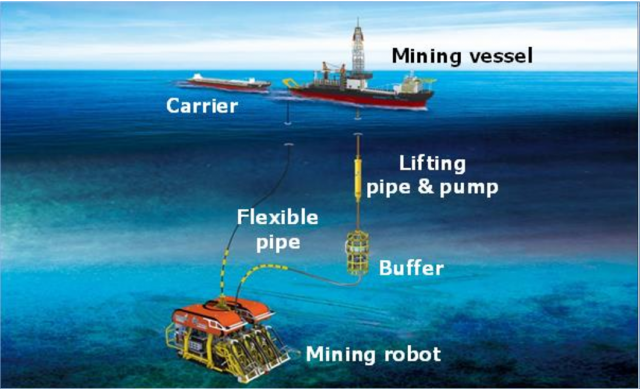Deep-sea mining would wreak enormous damage. Massive machines digging, dredging, and vacuuming up the ocean floor would create huge sediment plumes deep in the ocean that will drift on currents, smothering marine life, including species not yet discovered. Surface-level processing ships would dump tailings—the waste materials left after the target mineral is extracted from ore—back into the ocean, killing plant and animal life as it drifts through the water column, releasing acidic and toxic sediment hazardous to fish and those who consume it. This process would disrupt the ocean’s vast natural carbon capture and sequestration system, and release greenhouse gas from the seabed floor, accelerating climate change.
The reason for this enormous destruction is simple—so a few mining companies can reap a profit. But this motive is hidden behind a clever greenwashing campaign.
The mining companies’ justification for deep-sea mining is based on a big lie—that we need deep-ocean minerals for electric car batteries and the transition to green energy. We don’t. New longer-lasting car batteries are becoming available that don’t need deep sea minerals, including batteries based on graphene aluminum-ion, lithium-iron phosphate, iron-flow, and solid-state technologies. We also have the option of low-cost, no-impact extraction of battery materials, such as lithium and cobalt, directly from seawater. And importantly, a circular economy that prioritizes reducing, reusing, and recycling critical minerals can power the clean energy transition without deep-sea mining—and at a lower cost. Car battery recycling is already a rapidly growing industry. Perhaps the best evidence that deep-sea mining is needless is the strong message from the electric vehicle industry: forward-thinking manufacturers including BMW, Volvo, Volkswagen, Renault, and Rivian are supporting the moratorium.
Mining companies are rapidly advancing their efforts to begin deep-sea mining through their powerful influence on a little-known, secretive organization in Jamaica, the International Seabed Authority. This autonomous organization has been mandated to oversee the world’s deep-sea resources “for the benefit of mankind as a whole.” But it’s become a classic case of the fox guarding the chicken coop. Much of the ISA’s operations are conducted behind closed doors and include questionable deals with selected mining companies. Through opaque processes, the rights to the world’s deep-ocean resources are being auctioned off for the benefit of a few mining companies with scant regard for the rights of the rest of the world.
Deep-sea mining is not a distant threat—it’s a clear and present danger. The ISA has already issued mining exploration contracts covering a staggering 1 million square kilometers (400,000 square miles) of the Pacific Ocean, and is preparing to issue licenses to start large-scale mining as early as July, 2023. The ISA knows the opposition to deep-sea mining is growing as more people become aware of the threat and is now rushing forward the approval process. On September 7, the ISA authorized the mining of 7.2 million pounds of polymetallic nodules in a “collector test.” That operation is now underway.
Urgent action by the U.S. is critical to stop deep-sea mining. We call on President Biden, supported by Special Envoy for Climate John Kerry, to express support of the moratorium at the upcoming climate change conference, COP27, and to use the resources of his administration to halt this needless destruction.
The United Nations should also take action. It should protect the ocean and its resources for all humankind—not allow it to be sacrificed for the profits of a few. We cannot allow the ISA, as it is currently run, to govern the fate of the world’s last global commons: the deep sea. The U.N. and its Secretary General António Guterres should publicly support the moratorium and take action to bring the rogue ISA back in line with the values of the U.N.
***
Sylvia Earle served as the Chief Scientist at the National Oceanic and Atmospheric Administration. She is the founder of Deep Ocean Exploration and Research, a National Geographic Explorer in Residence, Founder of Mission Blue, and an Ocean Elder.
Twitter: @SylviaEarle
Daniel Kammen is the James and Katherine Lau Distinguished Professor of Sustainability at the University of California, Berkeley where he directs the Renewable and Appropriate Energy Laboratory. He has served as Chief Technical Specialist for Renewable Energy at the World Bank, and Science Envoy in the Obama Administration.
Twitter: @dan_kammen
For the Blue Climate Initiative’s information and campaign for a moratorium on on deep seabed mining, see here:
https://www.blueclimateinitiative.org/deep-sea-mining-moratorium
